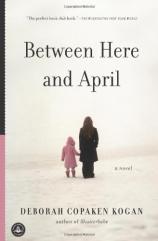Reading Group Guide
Discussion Questions
Between Here and April

1. Lizzie tells her shrink she feels “lost.” Is it personal? Societal? A combination of both? In which ways are both Lizzie and Adele representative of the gender politics of their times? In which ways are they simply human?
2. Lizzie and Mark have some unresolved issues in the bedroom. How do themes of human bondage inform the rest of this story? At the end of the book, we’re left in the dark as to whether these issues get resolved, either in the master bedroom or in the marriage. Is bondage, whether explicit or implicit, an inescapable element of love? When you imagine Lizzie and Mark’s marriage five years, ten years, twenty years down the road, what do you see?
3. 1972, the historical setting of this book, was the golden age of journalism but in 2007, the modern-day setting of this book, journalism has entered a period of crisis. Celebrity culture has all but drowned out the news. Newspapers and magazines are foundering. How do these issues affect Lizzie’s life and career? Should Lizzie have gone to Iraq? Why or why not? If she were a man and a father, would your response be the same?
4. Consider Renzo: should he have gone off to war and left a pregnant girlfriend behind? How has Renzo, in his own work, dealt with the issues facing the modern-day journalist? “No more close-ups of the crying widows,” he tells Lizzie, “and the bleeding soldiers and the little child with the shrapnel stuck into the skin on his face in the hospital bed. We have seen these pictures too many times, in too many places. They have become meaningless.” Is he right? Have we, as a society, become inured to the pain of others?
5. Eyewitness accounts --- of an event, of a life --- are inherently inaccurate. When Lizzie sets out to discover the why of Adele’s crime, she talks to several eyewitnesses, each of whom give her versions of the story based on their own particular lives and biases, none of whom provide the kind of answers Lizzie’s hoping to find. “You think you need facts to write truth?” Renzo exhorts her, and by the end, she accepts that he’s right: she must settle for the musings of her own imagination to get to the truth of the story. What are the limitations of such novelistic inquiry? What are the limitations of journalistic inquiry? Is one “better” than the other, “truer”? If so, how?
6. How does the repression of painful memories and events influence both Lizzie’s life and the plot of this novel? Are some things better left repressed or should they be brought to the surface in order for the psyche to right itself?
7. All the main characters in this novel --- Adele, Lizzie, Mark, Renzo --- are dealing, in one way or another, with the fall-out from maternal wrath and/or abandonment. How are their situations similar? How are they different?
8. Dr. Rivers asks Lizzie what Renzo represents. Lizzie responds, “Oh, I don’t know. All the normal cliché things, I suppose. Freedom. Love. The path not taken…” Is this a cop-out or the best possible answer Lizzie is able to offer? What do you think Renzo represents to her? What does he represent to the story?
9. If Lizzie had married Renzo instead of Mark, what would her life have looked like today? Do you fault her for her adulterous behavior or did you see her actions as inevitable, understandable within the confines of her situation?
10. Is Lizzie a good mother? If so, how? If not, what advice would you give her? What about Adele? Were you able to empathize with her actions in any way, or were they completely anathema to your way of thinking about motherhood and therefore indefensible? If Adele could talk from the grave today, what would she say, how would she defend her actions? Would she consider herself a good mother?
11. Trudy Levine teaches a class called “Misogyny in Literature.” When Lizzie asks her which novels she studies, Trudy replies, “All of them.” Is this a fair assessment of literature? If you were designing such a class, which authors and novels would you include? Is this novel misogynistic in any way? If so, how? Does the author treat her male characters fairly? Empathetically? Cruelly?
12. When Lizzie tries to find the woods where Adele killed herself and her children, she finds instead a new development of McMansions. “Refugee camps I’d visited in Somalia had more joy in them that that house,” she says, “yet there it was (I zoomed out until the whole house was in the frame): The American Dream.” How does Lizzie feel about this American Dream? In which ways might the house represent those feelings?
13. “Revenge! It’s built into our RAM just as surely as hunger,” Lizzie muses, when she frets over the future legacy of Iraq. Is a desire for revenge part of our genetic make-up? Is Lizzie driven by it? What about Adele? What makes you believe this?
14. When Lizzie takes her own children into the frigid woods, she hits rock bottom, the icy center of hell. Why is she able to snap out of it, to find her way back out into the starry night, while Adele was not?
15. How has the structure of this book been informed by the structure of Dante's Inferno?
16. At the novel’s end, Lizzie goes to Italy, where she stands, pregnant and immobilized, in front of the last photograph of war Renzo ever snapped: a female suicide bomber, at the moment of detonation. How is this photograph a proper coda not only for Renzo’s life, but for the novel as a whole? What about Lizzie: why is she so moved by that image, unable to look away?
Between Here and April
- Publication Date: November 3, 2009
- Genres: Fiction
- Paperback: 304 pages
- Publisher: Algonquin Books
- ISBN-10: 1565129326
- ISBN-13: 9781565129320








